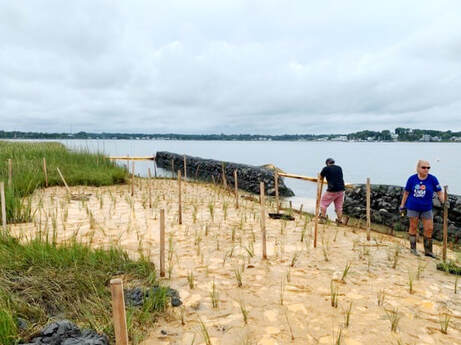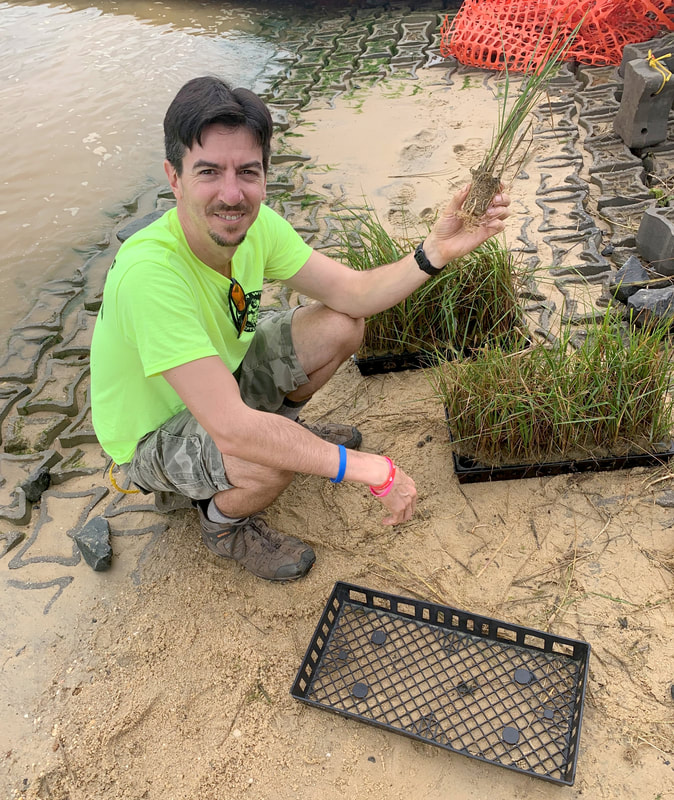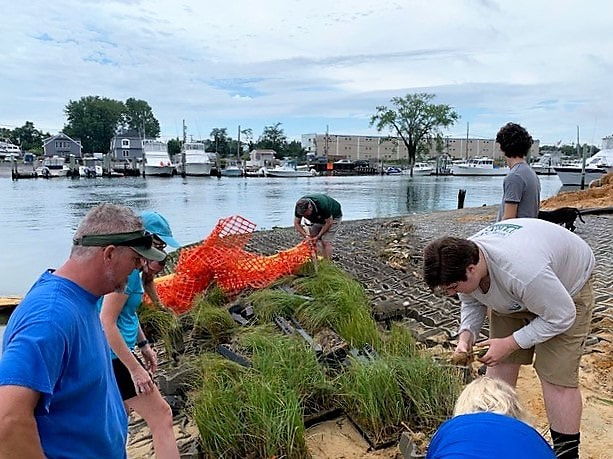Public-Private Partnership Aims to Shore Up Eroded Section of Neptune's Shark River Island8/31/2021
Despite delays and weather issues, over 25 volunteers and local homeowners joined the Littoral Society on Saturday, August 21 to help restore a salt marsh and create a hybrid living shoreline on Shark River Island in Neptune Township, NJ. The work on the living shoreline was part of a larger project to stabilize an eroding shoreline that is owned by Seaview at Shark River Island Homeowners Association (a community of approximately 200 townhouses). "While calling a waterfront community home has many benefits, it also brings unique challenges," said Michael Brantley, Mayor of Neptune Township. "This partnership, including Monmouth County, the Seaview Island Homeowners Association, Neptune Township, and the American Littoral Society, is making an incredible impact and will protect the lives and property of our residents, as well keeping our shoreline beautiful, for generations to come.” The project also involves Stockton University, The Nature Conservancy, and private companies (including ECOncrete and Renova Environmental Services), which brought either additional expertise for engineering and monitoring of a project that combines natural solutions - such as the living shoreline - with hard barriers, like concrete mattresses or additional funding.  "This area has suffered heavy erosion that not only impacts the condo owners but also the ecological community," said Capt. Al Modjeski, Habitat Restoration Program Director for the Littoral Society. "As our part of hybrid living shoreline, we planted nearly 2,000 plugs of native grasses in the eroded marsh to widen the storm buffer between the inlet and the island, planted some test plots within the concrete mattresses to soften those structures, and also planted native shrubs and grasses along the newly created upland berm to further establish a stronger, more resilient shoreline that relies on nature and provides new habitat." Planting at the site was twice delayed due to equipment issues. The two dozen volunteers who turned out on Aug. 21 also had to contend with weather related to Hurricane Henri’s movement up the east coast as it headed toward landfall in Long Island and Connecticut. Hopes are the project will become a model for future use of nature-based measures to stabilize vulnerable and eroding shorelines, reduce flood risk, and protect critical infrastructure. “The Littoral Society is working to show that working with nature is not just possible but also effective for protecting coastal areas and helping them adapt to the impacts of climate change,” said Tim Dillingham, Executive Director of the American Littoral Society. “We are working from Jamaica Bay to the Delaware Bay to create models for living shorelines, restore neglected natural areas – including salt marshes – and rebuild habitats for endangered species such as red knots and horseshoe crabs. “While there are similarities to all coastal environments, the unique characteristics of each has led us to work with projects that range from entirely nature-based to hybrids designed to deal with higher energy waves or currents,” Dillingham added. “We believe the work on Shark River Island will lead to ecological restoration and coastal resiliency at the site, while also pointing toward a new way to care for the coast.” ECOncrete is the company behind the concrete mattresses used in the project. The mattresses are flexible and hydraulically stable mats that are intended to stabilize the submerged part of the eroded area while also supporting growth of both plants and marine animals, such as oysters. The mattresses have previously been used on sustainability projects at the Port of San Diego and Port of Vigo. The concrete mattresses will be coupled with two additional flooding and erosion control structures, a nearshore sill and upland berm. Both are intended to help dissipate wave energy and protect the adjacent marsh area. The sill will further reduce sand movement in the submerged section of the site. “This is a truly unique partnership," said Andrew Rella, PhD, Technical Director of Business Development, for ECOncrete Inc. "Our aim is to create a hybrid living shoreline to prevent the ongoing erosion between the marsh and marina bulkhead at the northwest corner of the Island and to provide an ecological uplift across the site, which will transform the area for community members looking to utilize the shoreline for recreational purposes, specifically for fishing and kayaking. It is an immense honor to be part of the site’s transformation, restore its ecological balance and help safeguard the township.” Annette Bergstein, president at the Seaview at Shark River Island Homeowner’s Association, said: “We are so pleased that the project will not only stabilize our property but also the Township's existing pumping station, located close to the severely eroded shoreline. After exploring the options for protection and restoration of this area, the HOA and the Township were certain that this nature-based approach would be most suitable for the island and protection of our infrastructure.” The full-scale installation follows a 2-year pilot project that was granted approval by local and federal regulatory authorities and has the support of the property owner Seaview at Shark River Island Homeowners Association, as well as the Neptune Township Director of Engineering and Planning. Post-installation monitoring, which will involve Stockton University, will take place over the course of several years to evaluate the performance of the overall project, with the scientific results being paramount towards the future use of natural-based infrastructure measures throughout the region. Comments are closed.
|
Archives
July 2024
Categories
All
|



